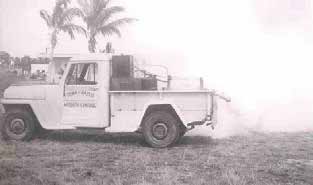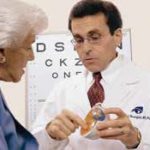Controlling SW Florida Mosquitoes

Patrick Linn, MS, MSHAPI Ex. Dir.
Collier Mosquito Control District
In 1950, Naples was a sleepy fishing town undiscovered by tourists. In fact, finding Naples on a map proved rather difficult. However, mosquitoes didn’t need a map and their sheer numbers in the Naples area severely limited outdoor activities.
A referendum in 1950, held in accordance with Florida law, established mosquito control in Naples. With no money, no employees, and no equipment, the newly formed organization borrowed a truck and driver from the Town of Naples to disperse a mist of insecticide throughout all six square miles of the small town.
That method of controlling mosquitoes was a singular one: targeting adult mosquitoes when conditions warranted. Since then, the science of mosquito control has evolved to include multiple facets that we refer to as Integrated Mosquito Management (IMM).

Mosquito control fogging was first accomplished with a truck borrowed from the Town of Naples.
Our IMM program today includes community education, habitat surveillance, and mosquito larvae control materials, with adult mosquito treatments being the last resort of controlling the pesky biters. Gone are the days when DC-3s flew in formation over Naples using thermal fogging to control mosquitoes (i.e., a mixture of insecticide and diesel). The DC-3s were sold long ago, and our aircraft today use Ultra-Low Volume systems that
apply a fine mist of insecticide at a rate of one-half ounce per acre when targeting adult mosquitoes.
Rapidly evolving technology is revolutionizing our IMM program, from the use of drones for mapping mosquito habitat to increasing the use of natural mosquito larvae control methods. For example, the District expanded the use of larvicides in 2019 by nearly 40 percent. We purchased a new helicopter that accommodates a larger system for the distribution of the granular larvicide material.
The larvicide poses no harm to humans, fish, plants or animals, and its effect can reach up to 30 days. We are finding that the larvicide reduces the number of treatments required to target adult mosquitoes in a given area during the season.

We are using drone technology for inspection of mosquito habitat and applications of material targeting mosquito larvae.
Additionally, education is at the very foundation upon which IMM is built. Our Communication/Education staff is continually expanding our reach into the community. From educational presentations in area classrooms to participating in community events, they seize opportunities to inform people about the District’s “what, why and how,” as well as what citizens can do to protect themselves from mosquitoes.
Moving forward, the District will strive to improve our IMM program by continually researching the development of new control materials, using advanced technology to reduce mosquito habitat, and embracing proven industry best practices amid the
backdrop of rapidly changing science and technology.
Want to learn more about the our IMM program? We welcome visitors for tours of the District’s campus located at the Naples Airport, which include presentations by our scientific team in the laboratory, our operations/surveillance team, and a visit to the hangar. Please call our office at (239) 436-1000 to schedule a tour or if we can provide more information.



Leave a Reply
Want to join the discussion?Feel free to contribute!